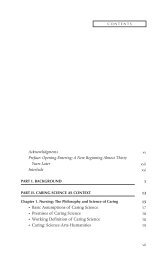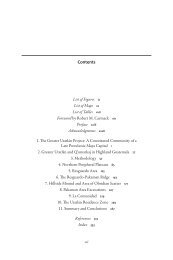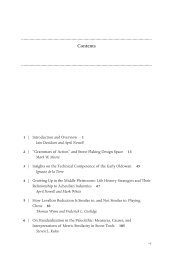free download - University Press of Colorado
free download - University Press of Colorado
free download - University Press of Colorado
Create successful ePaper yourself
Turn your PDF publications into a flip-book with our unique Google optimized e-Paper software.
Fail to Prepare, then Prepare to Fail<br />
logical data can be brought together in an informative way. The discussion<br />
in this chapter raises some interesting observations that merit more extensive<br />
comparative discussion. More fine-grained proxy data for local paleoclimates<br />
and paleoenvironments are required to bring the impacts <strong>of</strong> sudden environmental<br />
change to the archaeological scale <strong>of</strong> human occupation at individual<br />
settlements. However, perhaps most important, an improved dialogue needs<br />
to be opened among archaeologists, climatologists, and disaster management<br />
experts, as there is no doubt that archaeology has innovative perspectives and<br />
important lessons to contribute to a much wider debate (Anderson et al. 2007;<br />
Giddens 2009; Jansen et al. 2007).<br />
Acknowledgments. This research was made possible through funding from<br />
the Arts and Humanities Research Council (AH/1002596/1), Leverhulme<br />
Trust (6/SRF/2008/0267), <strong>University</strong> <strong>of</strong> Leicester School <strong>of</strong> Archaeology<br />
and Ancient History, and Natural Environment Research Council (P17233-<br />
60). This chapter was inspired by the Global Long Term Human Ecodynamics<br />
Conference organized by Andrew Dugmore, Tom McGovern, Astrid Ogilvie,<br />
and Sophia Perdikaris at Eagles Hill in 2009. I also thank Roberto Valcárcel<br />
Rojas, for his longstanding co-direction <strong>of</strong> this project, and colleagues in<br />
Cuba who have collaborated and contributed to this research, including<br />
Celso Paso Alberti, Jorge Calvera Rosés, Gabino la Rosa Corzo, Raúl Gómez<br />
Fernández, Vicente O. Rodríguez, Elena Guarch, Odalys Brito Martínez,<br />
Pedro Cruz Ramírez, Juan Carlos Mayo Rodríguez, Yanelis Buchillón López,<br />
Idania Buchillón Jorge, Iosvany Martinez, Lazaro Calvo Iglesias, Indira Mayea,<br />
Dayessy Rojas, Daima Morel, Marcos Labrada Achoa, José Calvera, Nelson<br />
Torna, and Adrián García Lebroc.<br />
References<br />
Adam, Barbara<br />
1994 Perceptions <strong>of</strong> Time. In Humanity, Culture, and Social Life: Companion<br />
Encyclopaedia <strong>of</strong> Anthropology, ed. Tim Ingold. Routledge, London, pp.<br />
503–526.<br />
Alley, Richard B., J. Marotzke, W. D. Nordhaus, J. T. Overpeck, D. M. Peteet,<br />
R. A. Pielke Jr., R. T. Pierrehumbert, P. B. Rhines, T. F. Stocker, and L. D. Talley<br />
2003 Abrupt Climate Change. Science 299: 2005–2010.<br />
Anderson, David G., Kirk A. Maasch, Daniel H. Sandweiss, and Paul A. Mayewski<br />
2007 Climate and Culture Change: Exploring Holocene Transitions. In Climate<br />
Change and Cultural Dynamics: A Global Perspective on Mid- Holocene<br />
Transitions, ed. David G. Anderson, Kirk A. Maasch, and Daniel H. Sandweiss.<br />
Academic <strong>Press</strong>, London, pp. 1–24.<br />
107





